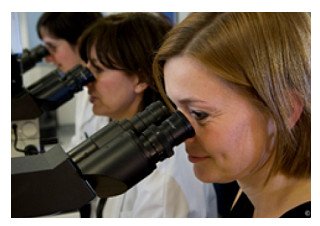 Anatomical pathology is a medical speciality whose role is to diagnose or confirm a diagnosis on the basis of analyses of tissue and/or cells taken from the patient. This diagnosis has a major role in evaluating the clinical prognosis and choice of treatment.
Anatomical pathology is a medical speciality whose role is to diagnose or confirm a diagnosis on the basis of analyses of tissue and/or cells taken from the patient. This diagnosis has a major role in evaluating the clinical prognosis and choice of treatment.
The anatomopathological examination consists of evaluating the prognostic factors and detecting the genetic mutations of tumour cells. On this basis the effectiveness of treatment can be predicted.
Since the introduction of targeted therapies it has become essential to incorporate fully this anatomopathological activity in the patient’s care pathway. It should also be stressed that reimbursement of these therapies is linked to these anatomopathological analyses.
The Anatomical Pathology Centre is charged with analysing tumours received from the Jules Bordet Institute, the Erasmus Hospital, the HUDERF children’s hospital, St Pierre University Hospital and the Ixelles and Molière sites of the IRIS SUD hospitals. It is a reference centre in a number of fields, including the diagnosis of breast, gynaecological, digestive, urogenital, pulmonary, soft tissue, hand and neck cancers and lymphomas.
The Department analyses:
- operative specimens removed during surgical procedures
- biopsies
- cytological samples (smears, etc)
- blood samples for specific cytogenetic examinations (traditional karyotypes for the diagnosis and monitoring of leukaemia and molecular genetic techniques in order to provide prognostic factors).
The Department operates to the ISO 15189 standard.
- For access to documents and information specific to the laboratory, please click on this link:
https://www.hubruxelles.be/fr/cap-hub